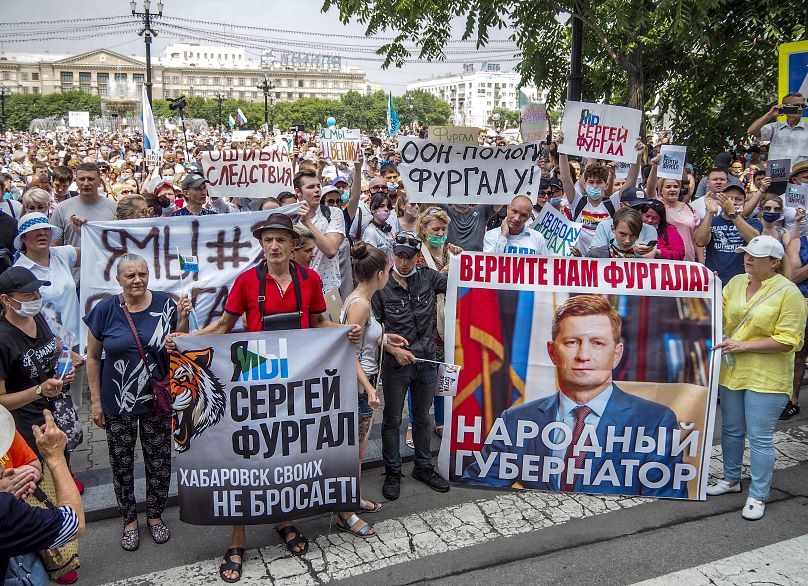Tens of thousands of demonstrators took to the streets in the eastern city of Khabarovsk in spite of several Kremlin attempts to dissuade them. Are Moscow's once-reliable methods of control diminishing?
Despite several attempts from Moscow to discourage protests, tens of thousands of people on Saturday filled the streets of Khabarovsk in Russia's Far East opposing the arrest of a regional governor.
In the run-up to the event, the Kremlin’s special envoy for the region talked of his understanding concerning the protests but demanded that they didn't go ahead, while authorities warned that people should not attend as they risked spreading COVID-19.
Yet, despite this, the second large-scale protest in the city in a week went ahead, following on from a rally the previous Saturday, with smaller demonstrations also popping up in nearby cities.
Many people at the demonstrations in Russia's Far East called for a fair trial for Khabarovsk governor Sergey Furgal, but there were also anti-Putin signs and chants.
With economic difficulty resulting from the COVID-19 pandemic — are the protests a sign of trouble ahead for Putin?
What's different about these protests?
Demonstrations in Khabarovsk concern the arrest of its governor two weeks ago for his suspected of involvement in several murders of businessmen in 2004 and 2005, before his political career began, according to Russia's Investigative Committee.
He denies the allegations but was flown to Moscow where he was put in jail for two months.
The election of Furgal, a member of the nationalist Liberal Democratic Party, was in itself unexpected, according to Maria Lipman, a political analyst and senior associate at George Washington University.
The Kremlin considered him too weak to win against the candidate it endorsed in 2018, she said, but he did and he has since delivered to the people in a direct, material sense that has apparently seen him gain in popularity given the amount who turned out to support him at protests.
The demonstrators saw his arrest as the "Kremlin imposing its will and they didn't like it," Lipman explained.
The protest situation in Khabarovsk is unusual for Russia due to two main reasons — the determination with which protesters are expressing their grievances and Moscow's seemingly gentle response.
"People have been tenacious in expressing their will," Lipman told Euronews, adding the Kremlin is showing "a degree of tolerance" in its reaction with no heavy-handed intervention from police.
In Moscow, actions of political opposition are met with a zero-tolerance attitude, with participants detained and sometimes "roughed up", she added.
The Kremlin didn't anticipate such a reaction to Furgal's arrest, according to Lipman, and its hands-off approach could be explained by it not wanting to aggravate the situation and expecting "protest sentiment to fade away".
Is support for Putin really sliding?
Putin's approval rating is at its lowest since he took office 20 years ago and he "clearly looks weaker"? said Lipman.
The Kremlin announced Putin had won a "triumphant referendum on confidence" at the start of July with over 78 per cent of voters endorsing amendments that would allow the leader to stay in power until at least 2036.
But the vote was marred with claims of fraud of various kinds, which shows the Kremlin can still demonstrate support like before but it comes at a higher cost, explained Lipman.
While the Kremlin's job of "keeping the country under control" has become more challenging, its leader still holds key cards in his deck that means he doesn't appear to be going anywhere fast, including no strong opposition and his control over armed authorities.
"The general mood in Russia is not upbeat but from having a sentiment and acting there is a very long distance," she explained.
People in Russia "generally don't see politics as an instrument they can use to make their lives better", according to Lipman.
Putin faces no real political opposition, she added, while the general public is "not as supportive of Putin, they are not really supportive of anyone else on a national level."
Rather than voting to express their discontentment getting behind the incumbent power, people will try and adapt to deteriorating conditions in the country.
Also playing in Putin's favour are the fact that both the political elite as well as organisations that can use force if needed, like the police, the armed forces, and the state security agencies, are all still loyal to him and if he needs to resort to harsher more repressive measures he can use them.
For these reasons, it would be wrong to assume Khabarovsk is a harbinger and a region after region will follow suit, said Lipman: "I don't think it works this way in Russia."
Moscow will treat the uprising in Khabarovsk as a local challenge, not a national one, she added.
On the severity of force the Kremlin will be willing to use, she said: "Somehow they will handle it, for better or for worse."












